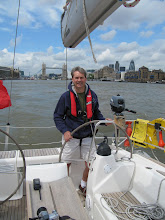
Well, I am writing this update sitting on the back of the boat watching the sun go down over Brixham, which is a pretty little harbourside town in Devon. Today we went for a day sail to Dartmouth and up the River Dart for a pub lunch. We had to inflate the dinghy and row ashore, and the current was so strong when we returned that those in the dinghy (not me!) had to be rescued by a motorised dinghy before our dinghy with oars disappeared up river. It was so nice arriving by water to the Ferry Inn in Ditisham, the last time I was there many years ago we arrived by car, small busy roads, and nowhere to park !!
As the title says, this week we are shore based in Brixham doing some land based courses. First  Aid on Sunday, then Radar, then Sea Survival yesterday. Sea Survival involves going to a swimming pool, seeing how the life raft inflates, and then jumping into the pool and scrambling into the life raft given various scenarios, including one with an unconscious crew member and water being sprayed over us from a hose. The real learning point however is that in a real emergency sitatuion, it is actually the cold rather than drowning which is the most dangerous. In the sea around GB, you might be lucky and survive 2 to 3 hours before hypothermia sets in, but only a few minutes in winter months. Hopefully I never have to put what I learned into practice.
Aid on Sunday, then Radar, then Sea Survival yesterday. Sea Survival involves going to a swimming pool, seeing how the life raft inflates, and then jumping into the pool and scrambling into the life raft given various scenarios, including one with an unconscious crew member and water being sprayed over us from a hose. The real learning point however is that in a real emergency sitatuion, it is actually the cold rather than drowning which is the most dangerous. In the sea around GB, you might be lucky and survive 2 to 3 hours before hypothermia sets in, but only a few minutes in winter months. Hopefully I never have to put what I learned into practice.
 Aid on Sunday, then Radar, then Sea Survival yesterday. Sea Survival involves going to a swimming pool, seeing how the life raft inflates, and then jumping into the pool and scrambling into the life raft given various scenarios, including one with an unconscious crew member and water being sprayed over us from a hose. The real learning point however is that in a real emergency sitatuion, it is actually the cold rather than drowning which is the most dangerous. In the sea around GB, you might be lucky and survive 2 to 3 hours before hypothermia sets in, but only a few minutes in winter months. Hopefully I never have to put what I learned into practice.
Aid on Sunday, then Radar, then Sea Survival yesterday. Sea Survival involves going to a swimming pool, seeing how the life raft inflates, and then jumping into the pool and scrambling into the life raft given various scenarios, including one with an unconscious crew member and water being sprayed over us from a hose. The real learning point however is that in a real emergency sitatuion, it is actually the cold rather than drowning which is the most dangerous. In the sea around GB, you might be lucky and survive 2 to 3 hours before hypothermia sets in, but only a few minutes in winter months. Hopefully I never have to put what I learned into practice. Yesterday evening we had a visit to the Coastguard Operation Centre in Brixham where the Officer in charge gave us a very interesting tour and presentation - with plenty of stories as well. It was fascinating and we spent a couple of hours there. They monitor VHF Channel 16 which is the emergency channel all the time, but they also monitor the movements of commercial shipping - which is now tracked electronically by computer. It will certainly help to have seen how the operation works from the inside because we receive all our weather forecasts via the Coastguard, and also we will be in contact with them as we sail around GB, particularly in the more remote passages.
Tomorrow is a diesel engine course which I am looking forward to, then on Friday some chart work which is tricky as you have to account for tides, tide heights, speed of tides, variation from magnetic north, local rules on navigation, interpretaion of charts, how to find information in the Almanac .... makes accounting look easy!
On Saturday we then start the next leg of the trip with our new Skipper - Fred. We have already met him and there are two stories he has already told us from when he was Skipper on previous Round GB trips. Firstly he managed to get over 14 knots out of our boat "Six Isles" in Scotland - which is very fast for a large yacht designed only for under 10 knots! Secondly he told us they had to call a lifeboat out to tow them into a port because the propellor had rope wrapped around it, a gale was building and the entrance to the harbour (and safety) was too narrow to attempt under sail. Oh well, nice to know that the RNLI already know our boat - should be fun!
Must go, it is now dark and I cannot see the keyboard ...
